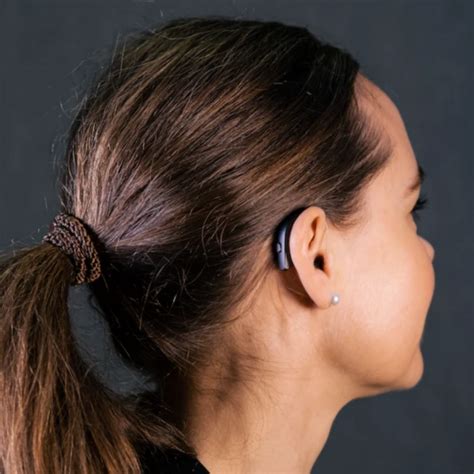Headlines
Hearing Aids Are Life Changing, And Getting More Affordable
I am hearing impaired, and I’ve had a hearing aid for about 20 years. Although my right ear is still fine, the hearing loss in my left ear is profound, impacting my ability to understand conversations and movies, and to discern where sounds are coming from around me. Unlike many people with hearing issues, rather than hiding my hearing loss, I am a bit of an evangelist about getting hearing aids due to the remarkable benefits I have experienced. They include:
- Hearing Birds Chirping, Children Speaking, Water Dripping and Other Amazing Things: Obviously, the biggest benefit is being able to hear things you completely miss without them. It’s much like getting a new pair of glasses and suddenly being able to see every leaf on a tree. You don’t know how much you’re missing until you suddenly regain the ability to see or hear more clearly.
- Automatic Streaming Audio: My ability to use my hearing aid to stream music and phone calls directly to my ear without needing earbuds or a headset is automatic and hands free in my office, car and everywhere else. When the phone rings, I just accept the call on my phone and automatically hear the caller in my hearing aid. My phone just needs to be nearby for the caller to hear me through the phone speaker. This is particularly great in the car, where my phone can stay sitting in a cupholder throughout the call. I also get alerts from numerous apps and gadgets directly via my hearing aid when I’m away from my phone or laptop, so I can go and check them, if needed. The software in my hearing aid, phone and car all work perfectly together with just a few minutes of initial set up.
- Avoiding the Embarrassment of Constantly Making People Yell or Repeat Themselves: Many people who know they are hearing impaired avoid getting a hearing aid out of vanity. Both men and women are fearful that people will see the aid. What they discount is the fact that their friends, family and colleagues are far more judgmental about their stubbornness, which means everyone around them feels they have to constantly yell or repeat themselves. It’s exhausting and annoying, and they should be far more embarrassed about the imposition they are causing others, in my opinion. Certainly, there are still times when I have to ask people to repeat something they said, but it is far less of an imposition than it would be without an aid.
- Tuning Out Noisy People Dining at the Next Table in a Restaurant: When I’m in a noisy restaurant and there’s a loud talker at the next table, or a gaggle of friends who feel compelled to shout their conversation to their friends located 3 feet from them, I can just adjust my hearing aid settings and tune them out. My husband wishes he had such a tool, as they continue to distract and annoy him throughout our meal. My aid is programmed with four channels that enable me to just click a button on the aid and change channels when I move to a different hearing environment, but I can also make more specific adjustments on my app to increase treble or bass, increase noise reduction, etc., on each channel.
- Turning off Tinnitus: Like many people with hearing impairment, mine comes with the annoying, intermittent ringing of tinnitus. Often, just putting in my hearing aid in the morning makes it go away for some reason – maybe because other sounds drown it out? When that is insufficient, I have a second app that streams “sound therapy” that masks the ringing and after about 10 minutes, I can turn it off and I no longer hear the ringing. I have no idea why it works, but it seems like a “Jedi Mind Trick” that somehow makes the brain focus on hearing everything other than the ringing.
- Quality of Life: In the years between when I realized I had a hearing impairment and when I got a decent hearing aid, I made several decisions to avoid certain situations where I simply could not hear and participate in conversation. I dropped out of a women’s business networking group and a social group because I had such a hard time understanding the other women when so many were speaking at once all around me – and all of their voices were within the higher-pitched range where I am most impaired. I felt rude and embarrassed to ask them to repeat themselves because I couldn’t understand. And it was exhausting trying to concentrate so hard to understand the conversations. After I got a good hearing aid, I’ve been able to re-join these groups and simply adjust my aid to enable me to understand even in these difficult environments. The reduced stress level from these events, and the fact that I no longer have to think about my limitations when deciding which event I want to join, have been life changing.
The hearing aid that I use is the ReSound One Receiver-in-Ear model. It comes with two free apps: the Smart 3D app controls the hearing aid settings, and the Relief app is the Tinnitus manager. It’s important to note that ReSound is compatible with iPhone, so it may not be ideal for you if you have a different phone model. The Relief app is available in the app stores for use by anyone who has tinnitus, regardless of whether they have hearing aids. The apps are also compatible with Apple Watch.
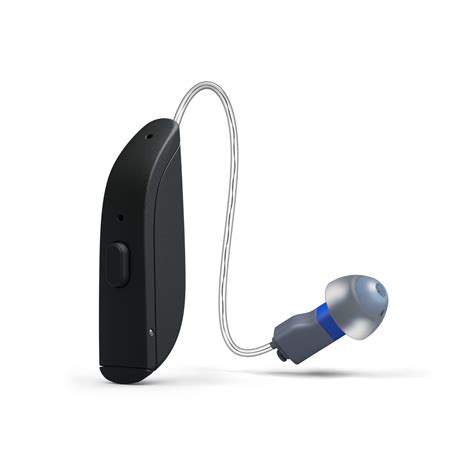
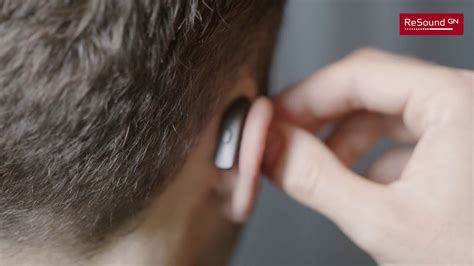
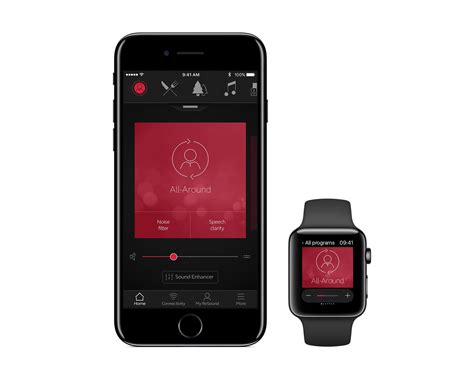
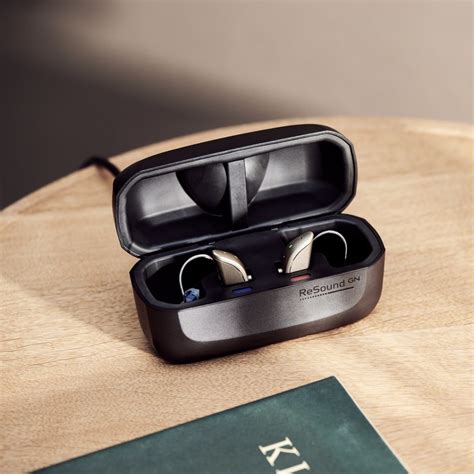
My very first hearing aid was the only model covered by my insurance at the time. It was one of those cheap hearing amplifiers that just makes everything louder, which can be helpful if you’re in a quiet environment and just want to hear your spouse or the television better. If you try and use it in a noisy restaurant or business meeting, it’s useless. It is, however, a good first step for those who are hoping to get by with a cheaper option.
After that, I went to an audiologist who set me up with my first ReSound aid (I’m on my second one now). The process of getting a quality hearing aid includes getting your hearing tested to determine your specific needs, purchasing the aid(s) you want and getting them adjusted so you can hear clearly. With the better hearing aids like mine, this includes programming multiple channels for use in most environments, in restaurants, outdoors and with streaming music. All of this can be done either in person at an audiologist’s office or completely online.
Hearing aids are expensive, but Medicare and commercial insurance are starting to provide some coverage and, as a result, there has been an explosion of new hearing aid manufacturers coming to market in the past few years. For example, Bose and Jabra have joined the hearing aid market in recent years, which makes total sense since both are best known for manufacturing high quality ear buds, headphones and other sound devices. The increased competition is bound to drive prices downward so more people will feel comfortable investing in them.
My ReSound smart hearing aid cost $3,000 for one and I had to pay for it out of pocket. It was worth it to me for quality of life and the many ways it makes my world easier to hear and understand. I’m hoping for a much cheaper alternative when I need a new one in several years. I’ve heard positive reviews of other smart hearing aid brands on the market – and there are many – including the Costco Kirkland hearing aids that they private label from Sonova International and the Eargo.
A few tips for choosing your hearing aid:
- Dexterity: With many hearing aids, including a few I’ve owned in the past, you’re constantly carrying tiny batteries around to replace them when the aid stops working. Many older folks, especially men with large hands, find the tiny batteries really frustrating. Getting a hearing aid that is rechargeable by simply placing it in a holder every night eliminates the battery battle.
- Technology Skills: I know a few people who have been talked into buying a smart hearing aid but have been unable to fully harness its capabilities because they are not tech-savvy and find it too complicated to use correctly. If you are trying to convince a family member to get an aid and they are not savvy enough to use a smart phone, it may be best to choose a more basic model for them.
- Audiologists are Aligned with Certain Brands: If you are going to Costco for your hearing test and aid purchase, you are obviously going to have only the Costco brands available to you. Similarly, your audiologist will typically represent and have in stock only one or two brands of hearing aid that they prefer and represent as a dealer. So, if you have your heart set on a specific brand of aid but want to go to a local audiologist for testing and fitting, your best bet is to go to the brand’s website and search for their list of dealers/audiologists near you. Or ask your audiologist which brands they use before you make your appointment.
Coping with Hearing Impairment at Home
If you have a loved one who is not yet ready to get a hearing aid, or if you are the one who is hearing impaired, here are a few suggestions to make life easier for you and your loved ones:
- Face to Face: First and foremost, make sure you are facing each other when speaking. It’s surprising how much we read lips to understand conversation, even when we’re not formally trained to do so. I was shocked to learn how much harder it was to understand people when they were wearing masks during the pandemic. Not only were they muffled, but I couldn’t read their lips to aid in my understanding. By looking at each other and speaking face to face, your conversations will be much easier for both parties.
- Don’t Yell, Enunciate: Another thing I learned during the pandemic is that enunciation – pronouncing your words fully and clearly – is much more important than speaking louder to someone who can’t hear you, regardless of whether this is due to a hearing impairment or an array of masks and plastic barriers between you. Almost everyone who was masked, barricaded and muffled during the pandemic would respond with yelling when someone couldn’t understand them, which just makes you a louder version of the unintelligible teacher from Charlie Brown. Pharmacists were the only people I encountered who consistently knew to step away from me, take down their mask and enunciate, in order to be understood and also avoid spreading germs.
- Meet Them Halfway: I have a friend who is frustrated by a hearing loss, but her audiologist says she’s not yet to the point of needing an aid. She is mostly having difficulty understanding her soft-spoken daughter. She was spending a lot of time asking her daughter to repeat herself, or chasing her daughter into other rooms when she wandered off while talking. In addition to the advice above, I suggested she stop making all the concessions and make it a team effort with her daughter. How? For one thing, ask her to follow the tips above, and train her to work with you by ignoring her when she doesn’t. If she leaves the room while speaking to you, she’ll eventually figure out you can’t hear her by your lack of response. If it was important, she will come back and finish the conversation. If it wasn’t, you didn’t miss anything.
This strategy also works for the chronic mumbler in your life. If you tell them repeatedly to enunciate so you can understand them and they keep lazy talking, make them learn the hard way.
For those coping with a stubborn hearing-impaired person who is avoiding getting an aid due to vanity, you can try the same “meet me halfway” strategy. Stop yelling and getting your ears blown out by a super-loud television. If you speak to them face-to-face and enunciate and they still don’t understand, stop conceding everything for their hearing benefit. They’ll get frustrated, but they might just take responsibility for their hearing and get some help.
This will not, of course, be a reasonable approach for everyone, as some cannot afford hearing aids or are simply too deaf to be helped by them. For those people, be kind and patient, and explore other types of aids to assist in your communication. It’s lonely to be shut out of conversation because you can’t understand it.
I would be remiss if I didn’t mention the one big benefit of being hearing impaired. When my husband is snoring, all I have to do is roll over so my good ear is on the pillow muffling the sound, and I can go right back to sleep. If only he could do the same when I am the one snoring.


